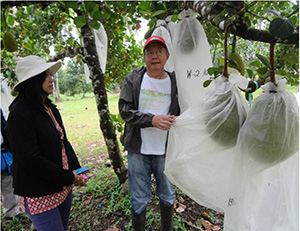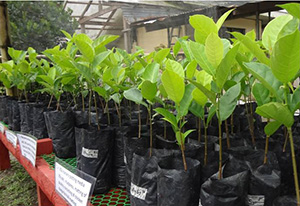Jackfruit is one of the most widely cultivated fruits in the country. It has excellent adaptation to a wide range of growing conditions and has many uses, both commercial and non-commercial.
With its importance as an industry, jackfruit has been chosen as a priority crop in a project being conducted in Eastern Visayas.
Titled Tropical tree fruit research and development in the Philippines and northern Australia to increase productivity, resilience and profitability, the project is implemented by the Australian Centre for International Agricultural Research (ACIAR) and the Philippine Council for Agriculture, Aquatic and Natural Resources Research and Development of the Department of Science and Technology (DOST-PCAARRD).
The project aims to develop and implement integrated disease management solutions to diseases caused by Phytophthora palmivora. The said disease causes jackfruit decline and seedling dieback, serious diseases resulting in significant yield loss in jackfruit.
The project also targets to develop and implement crop management options to improve productivity and fruit quality, and realize improved processing options for jackfruit.
 Research activities in project sites are spearheaded by implementing agencies, the Visayas State University (VSU) and Department of Agriculture – Regional Field Office 8 (DA – RFO 8). VSU handles experiments in disease management and studies in food processing. On the other hand, the Regional Integrated Agricultural Research Center (RIARC) in Abuyog and Eastern Visayas Integrated Agricultural Research Center (EVIARC) in Babatngon, both of DA, are conducting trials on disease and nutrient management, fruit load regulation, and flower induction.
Research activities in project sites are spearheaded by implementing agencies, the Visayas State University (VSU) and Department of Agriculture – Regional Field Office 8 (DA – RFO 8). VSU handles experiments in disease management and studies in food processing. On the other hand, the Regional Integrated Agricultural Research Center (RIARC) in Abuyog and Eastern Visayas Integrated Agricultural Research Center (EVIARC) in Babatngon, both of DA, are conducting trials on disease and nutrient management, fruit load regulation, and flower induction.
The effects of different potting media, sanitation, inoculation, and phosphonate application on the health of jackfruit seedlings are being re-evaluated under the project, among other activities.
 Research result shows that the combination of soil sterilization and phosphonate application reduced severity of Phytophthora disease in seedlings. A similar result was obtained with a highly porous potting medium.
Research result shows that the combination of soil sterilization and phosphonate application reduced severity of Phytophthora disease in seedlings. A similar result was obtained with a highly porous potting medium.
Inoculation trials using different Artocarpus species also showed that marang (Artocarpus odoratissimus) and camansi (Artocarpus camansi) are resistant to Phytophthora palmivora compared with EVIARC Sweet, a well known jackfruit variety. On the other hand, chempedak (Artocarpus lacootcha) is more susceptible to the disease than EVIARC Sweet.
A trial on scion – rootstock combinations is also being done for disease resistance. Highest rate of survival in grafts was observed in chempedak-jackfruit combination. Nursery sanitation was also found to be crucial in disease management.
Other on-going experiments include evaluation of the effect of scion-rootstock combinations on canopy growth and productivity, development of tools to manipulate flowering patterns in jackfruit to spread crop production and income generation, and development of crop load and nutrient management techniques.
Improved canopy of trees was observed by applying phosphonate and recommended fertilizer, which are complete (14-14-14), muriate of potash (0-0-60), and organic. It also enhanced flower emergence and produced heavier fruits.
In food processing, the project aims to refine the current vacuum fried jackfruit and alternative products produced in the country and to study “fresh cut” processing options for the fruit. For instance, VSU’s Department of Food Science and Technology is testing the process and product optimization of cocosap sweetened dehydrated jackfruit.
